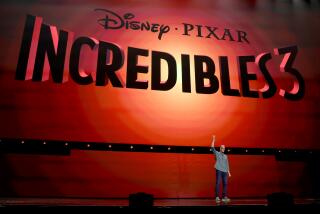Animated Clash of the ‘Titan’
For veteran animators Don Bluth and Gary Goldman, it must seem like an unpleasant sense of deja vu all over again.
In 1997, 20th Century Fox made its first foray into feature-length animation when the studio released their musical “Anastasia,” only to see the Walt Disney Co. step in and re-release its 1989 animated classic, “The Little Mermaid,” on the same day.
On Friday, Fox will roll out Bluth and Goldman’s latest animated effort, the big-budget, galactic adventure “Titan A.E.” Lurking in the wings again with the power to dampen Fox’s hopes is none other than Disney, which is releasing its G-rated “Fantasia 2000” on the same day that the PG-rated “Titan A.E.” bows.
Goldman, who co-directed “Titan A.E.” with Bluth, said it comes down to Disney not wanting any other studio to gain a foothold in animation. “It’s their territory,” Goldman said. “We’re stepping on their turf.”
Bluth charges that “Disney would like to monopolize the animation business, which I think is totally wrong. By monopolizing it, it won’t grow. It needs to grow. I would hope that someway they’d grow up, mentally, and let it happen, but they don’t seem to.”
“Fantasia 2000” already had a successful four-month run earlier this year at large-format Imax theaters, grossing about $50 million. Disney now wants to broaden the audience by opening the film in 1,300 regular theaters for a four-week run.
But “Fantasia 2000” isn’t the only animated movie “Titan A.E.” has to contend with. The film will be sandwiched between Disney’s “Dinosaur,” which opened May 19 and is expected to occupy theater screens all summer long, and DreamWorks’ clay animation British-made comedy, “Chicken Run,” which opens June 21.
The following week Universal unveils “The Adventures of Rocky and Bullwinkle,” which combines TV’s animated squirrel and moose with real-life actors Robert De Niro, Jason Alexander and Rene Russo, and on July 21, Warner Bros. comes out with “Pokemon 2,” the sequel to last summer’s hit based on the trading-card craze.
The stakes are high for Fox animation. According to sources, “Titan A.E.” cost about $90 million, and so far the early tracking hasn’t been encouraging. And unlike Disney features or even popular TV cartoons made into movies (“Pokemon,” “Rugrats”) “Titan A.E.” doesn’t come with a built-in audience.
Disney’s decision to place “Fantasia 2000” directly up against “Titan A.E.” has rankled Fox. There is still a belief heard on the Fox lot that while “Anastasia” should have performed better on its own when it debuted Dec. 14, 1997, with $14.1 million, “The Little Mermaid” ate into the box office for animation that weekend by taking in nearly $6 million.
Goldman said that when “Anastasia” opened overseas, it had trouble finding available billboard advertising space because Disney had been there first.
“Disney would buy up all the billboards, not just the ones they would normally use,” Goldman said. “They were buying it all out so Fox couldn’t even get the billboards. Disney people would call and apologize and say, ‘We’re sorry, but our orders from Burbank are to crush you and our jobs are on the line.’ ”
While that sort of bruising competition might be fine for live-action movies, where studios compete on a fairly even playing field, Bluth believes that it only harms the animation business.
Disney executives declined to comment on their competitive strategy.
Disney Follows Suit With Common Release Date
Fox announced in December that it would release “Titan A.E.” on June 16. Disney, meanwhile, opened the Imax version of “Fantasia 2000” on New Year’s Day and kept it on Imax screens for four months. On April 12, Disney informed Exhibitor Relations Co. Inc., an industry box-office tracking firm, that it would be releasing “Fantasia 2000” in regular theaters on Friday.
Fox is hopeful that if it can only get teenagers into the theater seats, “Titan A.E.” will sell itself. Produced by Bluth, Goldman and David Kirschner, “Titan A.E.” combines 3-D computer animation and traditional 2-D animation in a dazzling array of visual images of deep space and alien worlds. It also features the voices of box office stars Matt Damon and Drew Barrymore, and a driving soundtrack filled with a heavy metal beat produced by Grammy-winning producer Glen Ballard.
The film is set in the year 3028. The human race has been forced to flee Earth, which is destroyed by a fierce race of alien skeletal, energy-pulsating blue creatures called the Drej. Before the Earth is incinerated, a brilliant scientist is forced to leave his son, Cale, with others. Promising they will be reunited one day, he gives the boy a ring genetically encoded with a map to the Titan, a spaceship that holds the secret to the salvation of the human race--thus, the title “Titan A.E.” (After Earth).
When we next meet Cale (Damon), he has grown into a young man toiling unhappily on a grungy salvage station in space with a big chip on his shoulder because his father never came back.
Spurred on by his father’s friend, Korso (Bill Pullman), Cale goes in search of the Titan, joined by a sexy, no-nonsense pilot named Akima (Barrymore), a sarcastic alien named Preed (Nathan Lane) and Gune (John Leguizamo), the ship’s brilliant but unconventional navigator.
To emphasize the point that this is not your normal Disney movie, the filmmakers give the curvaceous Akima a shower scene--although much is left to the imagination.
Some characters and portions of the story line resemble elements of other sci-fi films like “Star Wars,” “Star Trek” and “The Last Starfighter.” Cale, for instance, is not unlike Luke Skywalker in looks and spirit. Korso has a bit of Han Solo in him. And the idea behind the Titan is reminiscent of the central plot point in “Star Trek II: The Wrath of Khan.” The film also has some of the look and feel of Japanese anime, which often uses fantasy or sci-fi themes.
“I really didn’t know the science-fiction genre that well,” Bluth, 62, said. “I’ve been to science-fiction movies, but I’m not what you would call a rip-roaring sci-fi fan. When it came time to do this movie, I had a couple guys next to me and I said, ‘I know I’ll do familiar things, but if I ever do things you think you’ve seen, stop me.’ ”
‘Iron Giant’ Didn’t Win Over Teens
But the jury is still out on whether American teens really want to see animated movies.
Last year, Warner Bros. had what many critics believed was one of the year’s best movies--animator Brad Bird’s “The Iron Giant”--but while the film was geared for young and old alike, it never did well at the box office, grossing only $23.2 million domestically.
“Teens don’t go to animation and the reason they don’t is that their whole lives they’ve had Disney, Disney, Disney, and it’s associated with the nursery,” Bluth explained. “The word ‘Disney’ is synonymous with ‘I’m a child.’ Their audience is children, so it works, but when [kids become teenagers], they say, ‘Hey, I’m no longer a child.’ ”
As a result, Bluth believes, animation has been “pigeonholed into the nursery and will not be allowed out.”
Bluth has had a roller-coaster career in Hollywood, but he once came close to knocking Disney off its animation pedestal.
In 1979, he and Goldman stunned the animation community when they abruptly left their jobs at Disney. The two went off to make “The Secret of NIMH,” which grossed only $10 million domestically for MGM in 1982, but its quality sent a wake-up call to Disney. Bluth and Goldman then joined forces with Steven Spielberg on “An American Tail,” which made $47.5 million domestically for Universal in 1986.
Disney, however, came roaring back under Michael Eisner and Jeffrey Katzenberg with such memorable animated musicals as “Beauty and the Beast,” “The Little Mermaid” and “The Lion King.”
As for Bluth and Goldman, the promise was never really fulfilled. In 1988, “The Land Before Time” earned $48.1 million and the following year “All Dogs Go to Heaven” grossed a modest $27.1 million. They were followed by lackluster films--”Rock-A-Doodle,” “Thumbelina,” “A Troll in Central Park” and “The Pebble and the Penguin.”
“Our goal, when we left Disney, was to turn animation around,” the 55-year-old Goldman recalled. “As arrogant as it sounds, that is how naive we were and how we thought maybe we can make a difference.”
Part adventure, part love story, “Titan A.E.” had its genesis in a project developed by Kirschner when Chris Meladondri was an executive at Fox’s main film division. Meladondri, who now heads Fox Animation Studios, thought it would make a great animated feature when he moved to his current position at the studio.
“Our approach was, how could we best translate this screenplay into a film, and we weren’t focused on the specific demographics of who the film would be for,” Meladondri recalled. “While I do think this movie clearly has an appeal to older than traditional audiences for animation, I also believe the movie can be enjoyed by a younger audience as well.”
The marketing task for Fox is daunting, but the studio is employing some novel approaches to tout its film.
To target the core audience of teenage boys, Fox sponsored three professional skateboarders at weekly meets, including an event billed as the world’s longest skateboard jump, which was televised during spring break from Lake Havasu in Arizona. The studio also set up an Internet Web site, https://www.afterearth.com, where Web surfers can join in a “Titan A.E.” simulation. And Hasbro has put out a line of “Titan”-themed toys that have just hit store shelves.
More to Read
Only good movies
Get the Indie Focus newsletter, Mark Olsen's weekly guide to the world of cinema.
You may occasionally receive promotional content from the Los Angeles Times.










